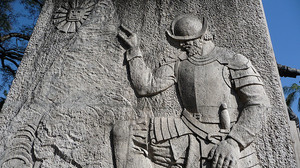A message about how the armor of God is meant to protect and not destroy, and how progressive Christians yet have a lot to answer for despite an intentional distancing from more fundamentalist denominations.
Listen to the sermon rather than read it. The text is included for your convenience, but it is not entirely like the delivered version, which includes nuances that can't be read.
Sermon delivered at Lutheran Church of the Cross in Berkeley.
August 23, 2015 - Thirteenth Sunday after Pentecost.
"Spiritually armed". Text is from Ephesians 6:10-20 & John 6:56-69.
Greetings to you, my sister and brothers, saints and sinners, children of God.
With this reading from John, we conclude the 5 week foray into the bread of life series, until we come back again to it in 3 years. And since I've only entered into it in the fourth week with my new family here at Lutheran Church of the Cross, I feel to really wade into this text head first with all my might be missing an opportunity that we could have had with a series, a journey started 4 weeks ago. And so let's set the gospel aside for a bit.
Paul's letter to the Ephesians is also kind of a conclusion. And while describing how the Christian acts when living a life filled with faith, this letter ends with chapter 6, wherein Paul describes in very vivid and graphic metaphors, how a Christian act in those troubling times when evil acts are around every corner, by putting on the whole Armor of God.

The belt of truth
The breastplate of righteousness.
And whatever sandals make one ready to proclaim the gospel of peace,
The shield of faith,
The helmet of salvation,
The sword of the Spirit, which is the word of God.
These were some very particular metaphors, and in light of the situation that the follower of Christ found themselves in in those days, weak and pacifistic as they were, the description of armor brings to mind the idea of a Roman centurion. But... one thing in particular stands out. Each of these items is defensive except one...the sword of the Spirit, and that is carefully described as the word of God. Also, lest people be under the impression that this is a call to war, Paul very carefully describes the footwear one wears as that which makes one ready to proclaim as gospel of Peace. Indeed, as defensive weapons these are used to protect oneself from the harms that come from the outside world, that the wrongdoings that he describes as from the evil one may be stood against.
This letter, while the notable epistle to the people of Ephesus attributed to Paul, although the actual letter may have been a general call to Christians all throughout the world and merely addressed to Ephesus in retrospect. And indeed, given the conditions that Christians were facing at the time, and it matters not whether Paul himself wrote it or one of his later students, because it was written during some of the greatest Christian persecution by the Romans, when families were rounded up and sent to the arena, when devotees were crucified, beheaded, and run through with the sword. When people were being tortured and killed simply because they believed in the name of Jesus Christ and called themselves Christian, but were afraid to proclaim the name of Christ in public for fear of the dire consequences, had their property taken from them by the government and given to influential members of the majority, and many other horrible consequences too numerous to name.
Just like what's happening to Christians in the United States today.
...
Oh wait.
...
I think persecution is not actually what's happening to the people who make up the majority of the population in the US...but actually something more akin to the reaction that the people in power have when others are challenging their privileged status. Funny how it kind of sounds like persecution when some Christians describe it. And we run the risk of danger when we take a look at passages such as these and think of them as some sort of call to war for Christians, which has got to be the furthest thing from the author's mind when he was writing it.
The people who were being written to were the marginalized, the downtrodden, the persecuted, the minority. And Christian with a capital C are the largest single demographic group in the United States today, can hardly compare their plight to the downtrodden of previous times. And as a fact, while we progressive Christians like to distance ourselves from those who come from a more fundamentalist bent, we all yet possess a shared Christian heritage, name, and what our fellow Christians do in the name of Christ becomes our cross to bear as well.
So where does this armor come into play when it's not to be used as a militaristic manner, against and opposing those who come outside our faith, as people such as the notorious group Oathkeepers would have us believe. How do we don these spiritual defenses in the world where our ministrations should not be a matter of enforcing our beliefs on others such as demands that biblical iconography be preserved like the ten commandments at courthouses and insistence that declarations of Happy Holidays are some cultural Marxism designed to dismiss our faith from public life.
No, Paul is not writing to the moral majority in the world, he is writing in the midst of persecution by that majority. And he is not calling for revolution against the pagan state but that the arms that people take up be protection against the sin of denying their own faith in public, protection against hearing the discomfort of Jesus and losing faith out of fear of reprisal.
This loss of faith which happened to the majority of people in today's gospel reading, who could not find the faith needed to see through the oddness of Jesus' proclamations in the 6th chapter of John. Because sometimes the message that Jesus would have us proclaim to us sounds hard. When the Gospel of peace means that we do things that take us out of our comfort zone, when feeding the hungry means that we sit down at tables with people who make us feel uncomfortable, when upholding the well-being of the downtrodden means that we have to say words or slogans that have us being ridiculed by others in our social class. It means explaining that when we say Black Lives Matter, it goes without saying that All Lives Matter too and why, going the extra step to address the racism and sexism, homophobia and transphobia that that exists even in our own community, even in liberal Berkeley, instead of running and hiding in our own privilege, like would be comfortable for us.
It means that visiting Jesus in prison like he says to do for the least of me, means actually visiting prisons and getting to know the men and women there not as criminals but as regular people, who have been convicted of committed crimes against the state.
And yes, Jesus's words are hard and troubling for those who persist in looking for outwards signs, who want a magic show, who want to be titillated by the great healer and miracle maker. And so it may not should have been a surprise in the gospel that upon hearing things they did not expect, and finding out that yes, they had to be a part of the miracle, that many of those who heard it remained.
But in staying with Jesus, in following Jesus through from beginning to end, the twelve (and many others) were engaged in a process of "coming to believe" in him.
They came to believe that a power (that which Jesus spoke of, the God of Abraham and Jacob, Moses and David) greater than themselves, could restore them to what we may see as sanity, a righteousness in God.
And in that faith, the discomfort of being the word of God in the world, of proclaiming the gospel of peace is made comfortable. We put on our feet whatever shoes we find will make us ready to be light of God in the world and apprehension becomes easy acceptance. We open our hearts and minds to the possibility that God's Holy Spirit will guide us and uphold us and we become sanctified and ready to confront the injustices that take place around us, even by those we have close to us, while knowing that we are empowered by the very strength of the one who grants us our salvation.
There are many changes in our lives. Some of us have recently lost people who are close to us and some of us have recently changed our lives by merging them with others. Some of us have embarked on new careers and others have retired or lost their job. Changes happening in our culture and the world at large are affecting us too, a drought here which reminds us that ecological justice is a matter of utmost importance, and the social changes that are making more and more of us confront our own place in the hierarchy of humanity. But God's place for us, as his beloved children, is assured. The salvation that God offers through the Lord Jesus Christ is one granted to us by the great gift of his body and blood, redeemed for all humanity by his death and resurrection on the cross and made us ready to receive God's will into our lives to do the great good he commands us to do through his gospel of peace and love.
Sisters and brothers, we become the people we are meant to be through God's great and unconditional love for us. We are equipped by the Holy Spirit to engage in righteous acts, and empowered to be the people of God he has made us into. The good news is that we don't have to struggle to love one another and be good to each other, it is by his mercy and grace that even when we sometimes fail to be perfect beings, with his love for us and gift of faith that we are able to persevere, daily donning the whole armor against that which would seem against us, and go forth in his light and love. Amen.


